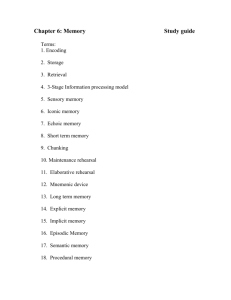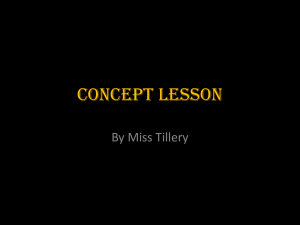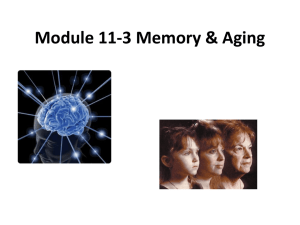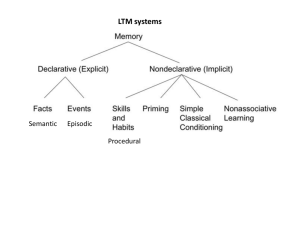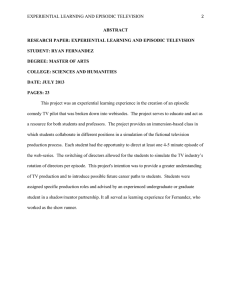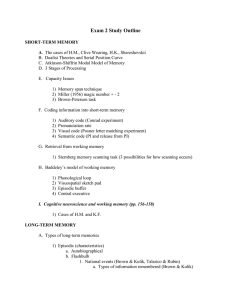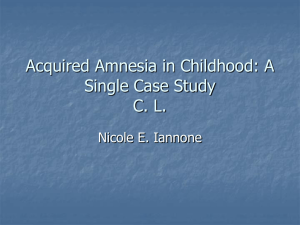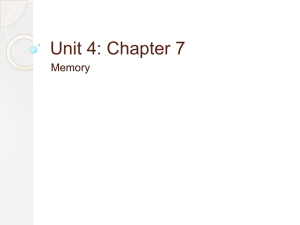Episodic Memory • Memory for an episode or event in your
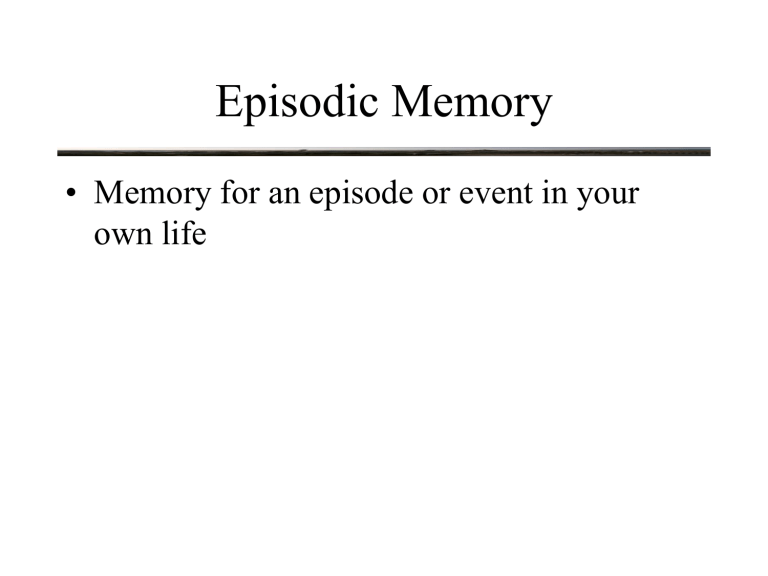
Episodic Memory
• Memory for an episode or event in your own life
Episodic Memory
• Memory for an episode or event in your own life
• Has temporal context (entails a sense of duration and date)
Episodic Memory
• Memory for an episode or event in your own life
• Has temporal context (entails a sense of duration and date)
• examples:
– recall breakfast
– what happened this weekend
Recalling Episodic Memory
• Recall is highly sensitive to context -
Similarities in context (especially smell) can trigger vivid recollections
Recalling Episodic Memory
• Memory is affected by the nature of your engagement with the information
• Levels-of-Processing Theory
Recalling Episodic Memory
• Memory is affected by the nature of your engagement with the information
• Levels-of-Processing Theory
– Consider this experiment:
List
CAT pie
PILLOW
TREE
Method of Learning
• stating capitals or lower-case
•repeating words
• putting words into a sentence
Recall is tested some time later.
Recalling Episodic Memory
• Memory is affected by the nature of your engagement with the information
• Levels-of-Processing Theory
– Consider this experiment:
List
CAT pie
PILLOW
TREE
Result:
•Best recall with “deep” processing
•Worst recall with “surface” processing
Recalling Episodic Memory
• Memory is affected by the nature of your engagement with the information
• Interpretation:
– the successful use of memory depends on the number of connections that are made between related items and the degree to which these are initially activated
Recalling Episodic Memory
• context is critical!
– location, physiological state, etc. affect ability to recall
– e.g. lists of words are recalled better when recalled where they were first learned
Recalling Episodic Memory
• Recall is a generative processes rather than simply calling up stored data
Recalling Episodic Memory
• Recall is a generative processes rather than simply calling up stored data
• Evidenced by the fact that episodic memories can be distorted or completely false under certain circumstances
Recalling Episodic Memory
• Misinformation Effect - exposure to information subsequent to storage of memory can alter the contents of the memory
Recalling Episodic Memory
• Misinformation Effect
• Consider the following example:
– Subjects were shown a video depicting a car accident
Recalling Episodic Memory
• Misinformation Effect
• Consider the following example:
– Subjects were shown a video depicting a car accident
– Then given the following question: “How fast were the vehicles going when they ______”
Recalling Episodic Memory
• Misinformation Effect
• Consider the following example:
– Subjects were shown a video depicting a car accident
– Then given the following question: “How fast were the vehicles going when they ______”
– Different subjects were asked questions that differed in the “magnitude” of the final word
Recalling Episodic Memory
• Misinformation Effect
• Consider the following example:
– Subjects were shown a video depicting a car accident
– Then given the following question: “How fast were the vehicles going when they ______”
– Different subjects were asked questions that differed in the “magnitude” of the final word
– The possible words were: Contacted, Hit,
Bumped, Collided, and Smashed
Recalling Episodic Memory
• Misinformation Effect
• Consider the following example:
– Average estimated velocity depended on the nature of the question
Recalling Episodic Memory
• Misinformation Effect
• Interpretation:
– Episodic memory can be distorted by subsequent information
Recalling Episodic Memory
• Misinformation Effect
• Interpretation:
– Episodic memory can be distorted by subsequent information
– Memory might be directly altered - the
Changed-Trace Hypothesis
– A second competing memory could be created by the question, which interferes with the initial memory - the Multiple-Trace Hypothesis
Recalling Episodic Memory
• Memory for episodes in life can be illusory
Recalling Episodic Memory
• Memory for episodes in life can be illusory
• Consider this example:
– Subjects were given a list of words to remember via a video tape of a man and a woman speaking the words
Recalling Episodic Memory
• Memory for episodes in life can be illusory
• Consider this example:
– Subjects were given a list of words to remember via a video tape of a man and a woman speaking the words
– Then given a list of words, some but not all of which had been studied, and asked to indicate which speaker had said the word or indicate “not sure”
Recalling Episodic Memory
• Memory for episodes in life can be illusory
• Consider this example:
– Subjects were given a list of words to remember via a video tape of a man and a woman speaking the words
– Then given a list of words, some but not all of which had been studied, and asked to indicate which speaker had said the word or indicate “not sure”
– 87% of the unstudied words were attributed to one of the speakers !
Recalling Episodic Memory
• A particularly difficult challenge regarding such False Memories arises when details of a crime are in question as in eye-witness testimony or repressed memories of abuse during childhood
Implicit and Explicit Memory: yet another distinction
• The successful recall of episodic memory entails a conscious awareness for the contents of the memory
Implicit and Explicit Memory: yet another distinction
• The successful recall of episodic memory entails a conscious awareness for the contents of the memory
• Explicit Memory is any memory that is both available and accessible by consciousness
Implicit and Explicit Memory: yet another distinction
• Are all memories explicit? Is all information stored in the brain subject to conscious scrutiny?
Implicit and Explicit Memory: yet another distinction
• Are all memories explicit? Is all information stored in the brain subject to conscious scrutiny?
• Implicit Memory refers to encoded memories that are not part of the “contents” of awareness
Implicit and Explicit Memory: yet another distinction
• How can we know whether memory is stored/recalled implicitly or explicitly?
Implicit Memory
• Consider the following distinction in recalling items from a list of words:
Implicit Memory
• Consider the following distinction in recalling items from a list of words:
• Free Recall - subjects can be asked to simply recall and report as many items as possible - these items are accessible as explicit memory
Implicit Memory
• Consider the following distinction in recalling items from a list of words:
• Implicit Recall - subjects can be asked to complete a word stem with any word that comes to mind (no mention of testing memory!)
__ack
Implicit Memory
• Consider the following distinction in recalling items from a list of words:
• Implicit Recall - subjects can be asked to complete a word stem with any word that comes to mind (no mention of testing memory!)
But how do you know that information is stored/recalled implicitly? Couldn’t it be explicit?
Implicit Memory
• Consider the following distinction in recalling items from a list of words:
• Implicit Recall - subjects can be asked to complete a word stem with any word that comes to mind (no mention of testing memory!)
• Twist - require subject to complete stem with a word that wasn’t on the list - if a word from the list is used preferentially, it was remembered implicitly
Implicit Memory
Consider the implications regarding the nature of consciousness and the connection between neural activity and awareness
Next Time:
– Repressed Memories by Beth Loftus
– Wednesday - neuropsychology of LTM and discussion of The Lost Mariner by Sacks
